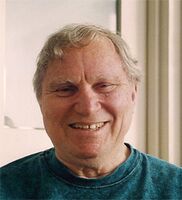Difference between revisions of "Bloom, A."
| (One intermediate revision by the same user not shown) | |||
| Line 7: | Line 7: | ||
|bio=Dr. Alfred Bloom has long been a pioneer in putting Shin Buddhism in modern context, showing its relevance to men and women of every age and culture. He began his life as a fundamentalist Christian, drawn to missionary work when, at the age of eighteen, he was sent to serve with the Army of Occupation in Japan. Hearing Amida Buddha used to interpret the Christian term "grace" roused his curiousity. When he returned to seminary, he became a liberal with an increasing interest in Buddhism. | |bio=Dr. Alfred Bloom has long been a pioneer in putting Shin Buddhism in modern context, showing its relevance to men and women of every age and culture. He began his life as a fundamentalist Christian, drawn to missionary work when, at the age of eighteen, he was sent to serve with the Army of Occupation in Japan. Hearing Amida Buddha used to interpret the Christian term "grace" roused his curiousity. When he returned to seminary, he became a liberal with an increasing interest in Buddhism. | ||
| − | In 1957, he returned to Japan for two years on a Fulbright, studying the life and thought of the radical thirteenth century monk Shinran, founder of Shin Buddhist tradition. From 1959 to 1961, he was at Harvard University, | + | In 1957, he returned to Japan for two years on a Fulbright, studying the life and thought of the radical thirteenth century monk Shinran, founder of Shin Buddhist tradition. From 1959 to 1961, he was at Harvard University, completing his doctorate and serving as the first proctor at Harvard's Center for the Study of World Religions. For several years he taught religious studies at the University of Oregon, joining the Religion Department of the University of Hawaii in 1970. (Source: ''The Promise of Boundless Compassion: Shin Buddhism For Today'', book jacket) |
|images=File:Bloom Alfred-Tricycle.jpg | |images=File:Bloom Alfred-Tricycle.jpg | ||
|yearbirth=1926 | |yearbirth=1926 | ||
| Line 22: | Line 22: | ||
|pagecreationdate=2015/08/13 | |pagecreationdate=2015/08/13 | ||
}} | }} | ||
| − | |||
| − | |||
| − | |||
Latest revision as of 16:07, 27 February 2023
| English Phonetics | Alfred Bloom |
|---|---|
| Sort Name | Bloom, Alfred |
| Birth: | 1926 |
|---|---|
| Death: | 2017 |
| Place of birth: | Philadelphia |
Tibetan calendar dates
| Website: | Wikipedia Page |
|---|
| Primary Language: | English |
|---|---|
| Translates from: | Japanese |
| Translates to: | English |
- Primary Affiliation (Workplace)
- University of Hawaii
PhD University
- Harvard University
Biographical Information
Dr. Alfred Bloom has long been a pioneer in putting Shin Buddhism in modern context, showing its relevance to men and women of every age and culture. He began his life as a fundamentalist Christian, drawn to missionary work when, at the age of eighteen, he was sent to serve with the Army of Occupation in Japan. Hearing Amida Buddha used to interpret the Christian term "grace" roused his curiousity. When he returned to seminary, he became a liberal with an increasing interest in Buddhism.
In 1957, he returned to Japan for two years on a Fulbright, studying the life and thought of the radical thirteenth century monk Shinran, founder of Shin Buddhist tradition. From 1959 to 1961, he was at Harvard University, completing his doctorate and serving as the first proctor at Harvard's Center for the Study of World Religions. For several years he taught religious studies at the University of Oregon, joining the Religion Department of the University of Hawaii in 1970. (Source: The Promise of Boundless Compassion: Shin Buddhism For Today, book jacket)
- Wiki Pages
